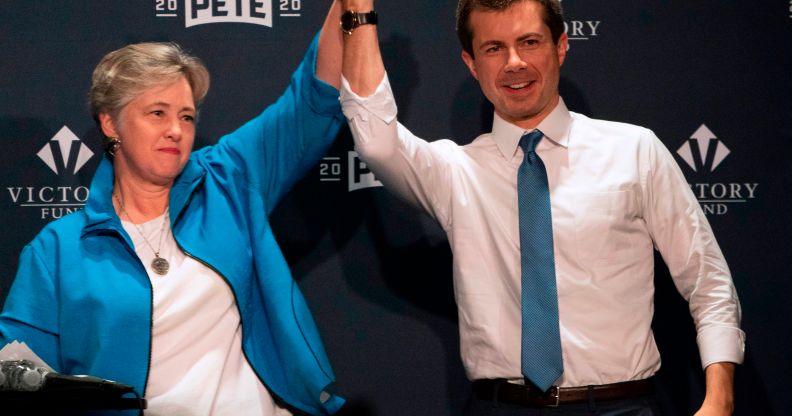This is why some lesbians don’t want Pete Buttigieg to be president

The LGBTQ Victory Fund announced that it was endorsing Buttigieg for president. (DON EMMERT/AFP/Getty Images)
Lesbian political activists in the US are divided over whether they want Pete Buttigieg for president or whether they want a woman, according to Politico.
Buttigieg, 37, the openly gay mayor of South Bend in Indiana, has attracted widespread LGBT+ support in his bid for the Democratic presidential nomination.
But interviews with prominent LGBT+ Democrats have shown that there is a “collision of goals and ideals in the community of lesbian political activists this year”, Politico reports.
“Mayor Pete, he’s a trailblazer,” said Campbell Spencer, a lesbian and political consultant who worked in the Obama White House and sits on the board of the LGBTQ Victory Fund – which this year endorsed Buttigieg to be president, it’s first-ever endorsement of a presidential candidate.
“But I’m one of these women who thinks we are way overdue for having a woman in the White House. That’s a lens through which I’m going to filter my decision,” Spencer added.
“It feels like a slap in the face to just go directly to the white gay guy, when for decades you’ve been trying to elect a woman and it didn’t happen last time,” said one lesbian Democrat who works in national politics. “If Pete Buttigieg is elected it won’t feel like a vindication of Hillary Clinton. If a woman is elected, it will.”
“As a woman, as a lesbian, as someone who was all in for Hillary Clinton and as someone who was a historic first myself, I would love to see a woman at the top of the ticket,” said Annise Parker, the former Houston mayor who is now president and CEO of the LGBTQ Victory Fund.
“And talking with other women inside the community and not, we understand the importance of Pete’s candidacy — but dammit, we’re half the population. It’s time” for a woman president, Parker added.
LGBT+ voters make up around six per cent of the US electorate, according to 2018 midterm election exit polls.
Buttigieg previously addressed his sexuality in a speech to LGBT+ campaigners at a Human Rights Campaign dinner in Las Vegas on May 11.
“I may be part of the LGBTQ community, but being a gay man doesn’t tell me what it’s like to be a trans woman of colour in that same community, let alone an undocumented mother of four, or a disabled veteran, or a displaced auto worker. But being gay, just like every other fact about me, means I have a story,” he said.
“And if I look to that story, I can find the building blocks not only for empathy, but for the impetus for action. The more you know about exclusion, the more you think about belonging, and we have a crisis of belonging in this country.”

